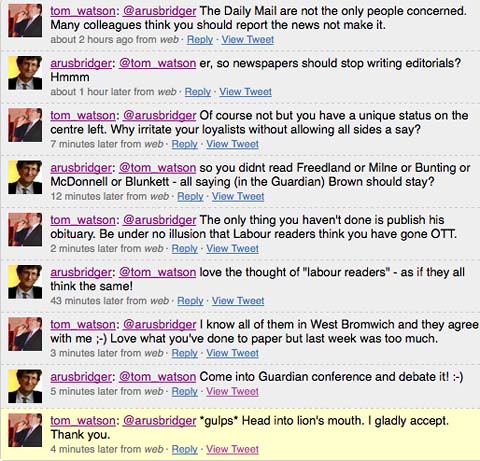The influence of UK-based democracy organisation, mySociety, often gets forgotten, perhaps deliberately downplayed, in the British press. Let’s go back to the MP expenses row, for example. Well before the Telegraph played its central role in exposing the various scandals, mySociety saw a significant campaign victory when Gordon Brown U-turned on an attempt to keep certain MP expenses details private, back in January.
At the time, mySociety’s founder, Tom Steinberg said: “This is a huge victory not just for transparency, it’s a bellweather for a change in the way politics works. There’s no such thing as a good day to bury bad news any more, the internet has seen to that.” But did mySociety’s, in my view, undeniably influential part get reported in the UK press? Not really.
So it was good to see that in Guardian editor Alan Rusbridger’s speech at the Media Standards Trust event earlier this week, all of which will be available to watch here, he opened with examples of online projects (two mentions for mySociety) – that do exactly what newspapers do – or used to – do. Is it journalism, but does it matter, he wondered.
Rusbridger gave three examples that showed, he said, ‘changes in how information is organised, personalised, ordered, stored, searched for, published and shared.’ These sites, he said, have many things in common with conventional journalism, ‘dealing with facts, with statistics, with information about public life, politics and services.’
- FixMyStreet (mySociety). Just as the Cotswold Journal draws public attention to potholes, FixMyStreet allows users to identify problems in their local area, and get them noticed. “That to me is essentially what a local newspaper is or was,” Rusbridger said. It’s ‘much more responsive’ and allows a ‘direct transaction between the citizen and the council’ he said. And it’s ‘crucially cheaper than sending out a reporter and a photographer,’ he added. “I don’t know whether that’s journalism or not, I don’t know if that matters.”
- TheyWorkForYou (mySociety). This, Rusbridger said, was ‘essentially what has replaced, or will replace’ parliamentary reporting, as he flashed up on the screen an example of the old-style reports from the Times in 1976. It’s ‘better than what went before’ he said. “I don’t know if that’s journalism or whether it matters.”
- EveryBlock. It provides information on local areas, just as a local paper does or did. Adrian Holovaty’s US-based project allows one to ‘drill down into every neighbourhood’ in a personalised way, he said. Crimes on your route to work can be plotted. “I don’t know if that’s journalism or whether that matters but I think it’s fantastically interesting.”
This is the relevant part of Rusbridger’s speech:
